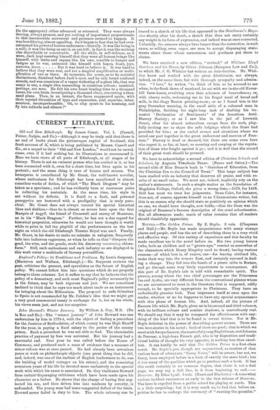John Howard's Winter Journey. By William A. Guy, M.B. (De
lti Rue and (Yo.)—The "winter journey" of John Howard was one undertaken by him in 1773-4, with the object of finding a precedent for the Justices of Bedfordshire, of which county he was High Sheriff for the year, in paying a fixed salary to the gaoler of the county prison. Such a precedent he was not able to find. The abominable practice of payment by fees was universal. But his journey had a successful end. Next year he was called before the House of Commons, and produced such a mass of evidence that a measure of minor reform was at once passed. He had already been seventeen years at work on philanthropic objects (one great thing that he did, and, indeed, was one of the earliest of English landowners to do, was the building of model cottages on his estate), and the remaining seventeen years of his life he devoted more exclusively to the special work with which his name is associated. Dr. Gay vindicates Howard from certairedisparaging criticisms which have been made upon his character as a father. He shows that the charge of having first neg- lected his son, and then driven him into madness by severity, is unfounded. The young man had.some congenital defect of the brain. Howard never failed in duty to him. The whole calumny can be traced to a sketch of his life that appeared in the Gentleman's Maga- zine shortly after his death, a sketch that does not carry certainly any weight in its form of expression, and indeed was at once corrected. Unluckily, the censure always lives longer than the correction, in such cases, so willing, even eager, are men to accept disparaging state- ments about those whose earnestness and goodness pat them to shame.
We have received a new edition, "revised," of William Lloyd Garrison and his Times, by Oliver Johnson (Sampson Low and Co.), to which Mr. J. G. Whittier hat! written an introduction. Mr. Whit- tier knew and worked with the great Abolitionist, not always, indeed, on the same lines, but with thorough sympathy and admira- tion. "I love," he writes, "to think of him as he seemed to me when, in the fresh dawn of manhood, he sat with me in.the old Haver- hill farm-house, revolving even then schemes of benevolence; or, with cheery smile, welcoming me to his frugal meal of bread and milk, in the dingy Boston printing-room ; or as I found him in the gray December morning, in the small attic of a coloured man in Philadelphia, finishing his night-long task of drafting his im- mortal 'Declaration of Sentiments' of the American Anti- Slavery Society; or as I saw him in the jail of Leverett Street, after his almost -miraculous escape from the mob, play- fully inviting me to share the safe lodgings which the State had provided for him ; or the varied scenes and situations where we acted our part together in the great endeavour and success of Free- dom." Slavery is dead or doomed, but there are some even here who regret it, so far, at least, as sneering and carping at the reputa- tion of those who fought against it go ; and it is well that the record of their great work should be perused.
We have to acknowledge a second edition of Christian Schools and Scholars, by Augusta Theodosia Drane. (Burns and Oates.)—The second title of Miss Drane's book is "Sketches of Education, from the Christian Era to the Council of Trent." This large subject has been studied with an industry that deserves all praise, and with re- sults of no small value. We must not, indeed, implicitly rely on the author's statements. In such a simple matter as the foundation of Magdalen College, Oxford, she gives a wrong date,-1473, for 1459. Still less must we trust her judgments. Dean Colet, for instance, does not, of course, approve himself to an Ultramontane writer, but this is no reason why she should state so positively an opinion which no one, we should have thought, now holds,—that the Dean was the original of Erasmus's famous description of the cruel schoolmaster. But all allowances made, mach of value remains that all readers should thankfully appreciate.




































 Previous page
Previous page